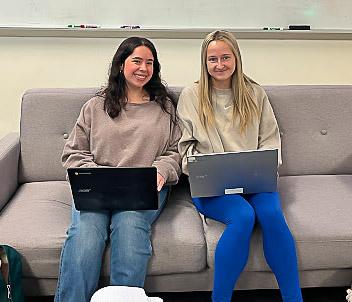Programming a future for women in computer science
When Dartmouth High seniors Brooke Adams and Mia Torres first enrolled in AP Computer Science Principles to fulfill the graduation requirement, neither had the intention to take it much further. Now, they are both planning to major in computer science in college.
“I became sort of addicted to coding, and I just started doing it in my free time,” Adams said.
At the end of the course, students are given an assignment where they have to design an app, which Adams finished in two days.
As a runner, Adams wanted to create an app that could help the user decide how many miles they should run on a given day.
“You can input how much water you took, how much sleep you had in a day, how many miles your last run was or how many days ago your last one was,” she said. “It would take that all in and it would output how many miles you should run.”
Torres, who said she’s always loved to dance, designed her app to help the user with their choreography in specific genres of dance.
“Being able to code and having both the structure of computer science while also having the freedom to use my own thinking and applying it to solve these problems, I just feel like it’s something that I could enjoy doing for the rest of my life,” she said.
Dartmouth High School recently won College Board’s AP Computer Science Female Diversity Award for its AP Computer Science Principles course, which was awarded to just 847 schools in the country.
College Board gives the award to schools based on the percentage of male versus female students enrolled in a course, said Eric Bosworth, a computer science teacher at the high school.
Offering computer science as a graduation requirement, Dartmouth High has had a high number of female students enrolled in computer sciences classes for the last five years, Bosworth said, adding that while it isn’t currently a state-wide requirement he wishes it was.
“Every class that’s required — math, science, English, history — you’re not going to love them all, but how are you going to know unless you take a bite?” he said.
Adams said she thinks more women would enjoy computer science if they believed it was something they were capable of doing.
The stereotype for computer science, she said, is that it’s “for smart men who just sort of sit at a computer and code all day,” but after doing research into the field, she realized this didn’t have to be the case.
“There’s so many branches that you can go into,” she said. “There’s even coding for fashion, and I just think if girls knew more [about] what you can do with it, it would probably be more appealing and something that more women would want to try.”
Bosworth said he thinks it’s important to represent all voices in all fields and especially when trying to solve a problem.
“You need that bit of empathy,” he said. “Even with something as simple as an app, you might look at it one way, and then hand it to a user who’s got a different perspective and they say, ‘Oh, well this doesn’t work for me, and here’s why.’”
Adams said that while it did feel a little lonely in class when she realized a lot of the other girls didn’t like computer science and didn’t understand why she also felt empowered.
“There is a part of me that’s like, ‘Oh, they do need more females in this major,’ and it’s empowering a little bit to be like, ‘Oh, I can do this,’” she said.
“In some ways you guys are forging that path ahead, and hopefully you can look back and say to someone behind you, maybe some young person in middle school, ‘Yeah, you should check this out,’” Bosworth said to Adams and Torres.












